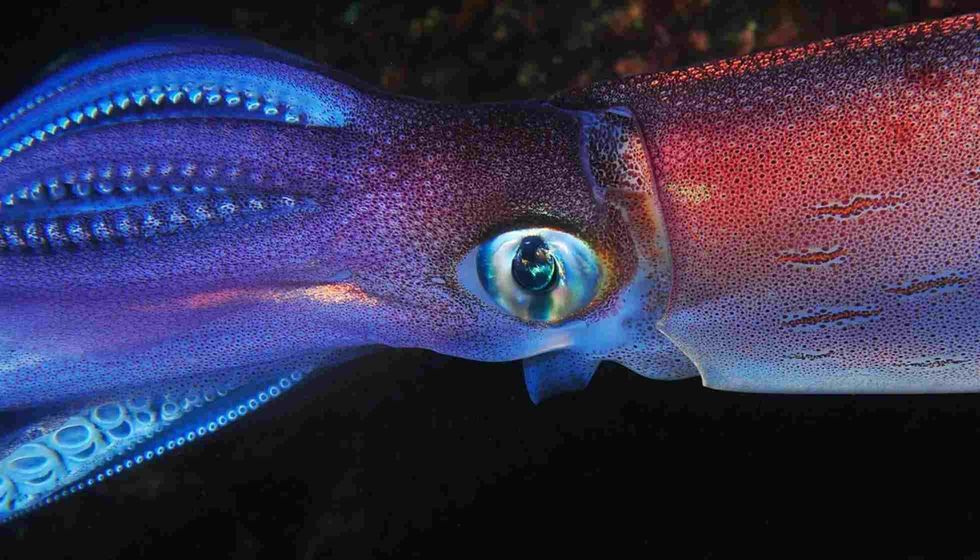The Colossal Squid (Mesonychoteuthis hamiltoni), or Antarctic Squid, is the largest invertebrate on earth.
The colossal equid can survive by eating just a single fish for months. It has eyes that are 10.6 in (27 cm) in diameter, meaning that even the eye of colossal squid fish is the largest eye in the animal kingdom.
They die shortly after breeding and mating, but luckily, colossal squids are not extinct. Adult colossal squids may reach a total length of 46 ft (14 m) including their tentacles.
Their weight increases with size and age, with adults thought to measure about 1000-1500 lb 456-680 kg). Colossal squids prey on chaetognaths, toothfish, and other deep-sea squids.
If you like these colossal squid facts, then do read our guides to swai fish and skate fish too.
Colossal Squid Interesting Facts
What type of animal is a colossal squid?
The colossal squid is considered to be the largest invertebrate on the planet.
What class of animal does a colossal squid belong to?
Colossal squids belong to the class Cephalopoda.
How many colossal squids are there in the world?
Roughly 12 colossal squids were recorded up to the year 2015, but there could be many more as they are notoriously hard to trace.
Where does a colossal squid live?
Colossal squids are mostly found in deep marine environments around the waters of Antarctica.
What is a colossal squid's habitat?
Colossal squids live in the deep-sea waters of the Antarctic but they can travel as far as the southern waters of New Zealand. They have been reportedly seen in both the Atlantic and Pacific oceans, as well as around New Zealand, South Africa, and in various other open waters.
Who does a colossal squid live with?
Information is not available.
How long does a colossal squid live?
The details of colossal squids are still uncertain. However, they are considered gonochoric, meaning that they die shortly after breeding and mating.
How do they reproduce?
Adult male colossal squids most probably fertilize females through direct contact after performing a display to win her approval. All squid lay eggs.
Some might lay single eggs while others lay clusters of eggs in a large jelly-like floating mass. These eggs hatch and miniature versions of the adults are born, which eventually grow to become fully-mature adults in one to three years. Specific mating behaviors are unknown among this species, but we do know that they reproduce through internal fertilization.
What is their conservation status?
At this time, the conservation status of the colossal squid is Least Concern. It is not endangered, but researchers do not have an estimate on the exact number of colossal squids that are in the world right now.
Colossal Squid Fun Facts
What does a colossal squid look like?
A colossal squid (Mesonychoteuthis hamiltoni) consists of a head, mantle, a collection of eight arms, and a pair of long tentacles, just like their related species. Its body is conical in shape and they have two broad fins that help them navigate through deep waters.
Their eyes and mouth are concentrated on the front end just before their beaks, arms, and tentacles.
Squid eyes are almost as complex as human eyes and are set into the sides of their heads. They have the most enormous eyes in the animal kingdom, reaching 10 in (25cm) in diameter!

*Please note that this is an image of a squid, not a colossal squid. If you have an image of a colossal squid, please let us know at hello@kidadl.com.
How cute are they?
As they are so huge, these squids aren't very cute.
How do they communicate?
We don't yet know how these squids communicate
How big is a colossal squid?
In terms of giant squid vs colossal squid, the average adult colossal squid size is 46 ft (14 m) while a giant squid ranges from 33-43 ft (10-13 m).
How fast can a colossal squid swim?
A colossal squid can swim at a speed of 20 mph (32 kmph).
How much does a colossal squid weigh?
Again, in terms of colossal squid vs giant squid, the colossal squid reaches up to 1091 lb (495 kg), while the giant squid weighs up to 606 lb (275 kg).
What are their male and female names of the species?
They don't have different male and female names.
What would you call a baby colossal squid?
A baby colossal squid is simply referred to as a baby colossal squid.
What do they eat?
The primary diet of colossal squid fish includes chaetognaths, toothfish, and other deep-sea squids.
Are they dangerous?
The low frequency of encounters with humans and the very low potential for interaction is the reason why colossal squids are not considered a threat to humans.
Would they make a good pet?
No, this species cannot be confined to domestic living, they belong in the sea.
Did you know...
Researchers believe that colossal squids are the primary food source for their predators, sperm whales. The discovery of colossal squid's beaks found in the stomachs of many sperm whales has provided key evidence into the size, shape, and habitat of these adult squids. This mammoth sea creature, eaten by sperm whales, is a very elusive ocean dweller.
How long does a colossal squid live?
A colossal squid is considered gonochoric, which means they die shortly after mating and breeding. They may live up to the age of two years, as observed so far.
What is special about the colossal squid?
The colossal squid species are able to survive just by eating a single fish for months. The colossal squid eye is the largest in the animal kingdom!
Here at Kidadl, we have carefully created lots of interesting family-friendly animal facts for everyone to discover! Learn more about some other fish, including codfish or fluke fish.
You can even occupy yourself at home by drawing one on our colossal squid coloring pages.









